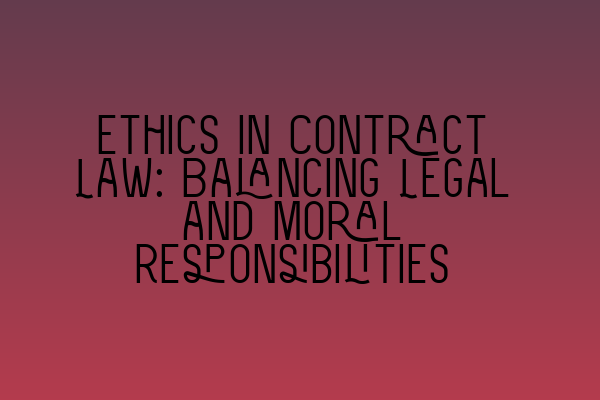Ethics in Contract Law: Balancing Legal and Moral Responsibilities
Welcome to SQE Contract Law, where we strive to provide you with comprehensive insights into the legal profession. In this blog post, we will explore the topic of ethics in contract law and discuss the challenges solicitors face in balancing their legal responsibilities with their moral obligations. It is essential for solicitors to uphold professionalism and act ethically in their practice, as these principles form the foundation of a just and equitable legal system.
Before delving into the intricacies of ethics in contract law, let us first clarify the meaning of ethics. Ethics refers to a set of moral principles that guide individuals’ behavior and decision-making. In the legal context, ethics plays a crucial role in maintaining public trust and ensuring fairness and justice in contractual relationships.
The Role of Solicitors in Contract Law
As solicitors, our primary responsibility is to provide legal advice and representation to our clients. In contract law, solicitors play a fundamental role in drafting, reviewing, and negotiating contracts on behalf of their clients. However, it is not enough to solely focus on the legal aspects of a contract. Solicitors must also consider the ethical implications of their actions and ensure that their clients’ interests align with moral standards.
One of the key ethical responsibilities of solicitors is to provide honest and accurate advice to their clients. This entails disclosing any potential legal risks or pitfalls associated with a contract. By navigating legal challenges and pitfalls proactively, solicitors can protect their clients’ interests and maintain their reputation as trustworthy legal professionals.
At SQE Contract Law, we recognize the importance of upholding professionalism in the legal profession. Our article on Ethical Responsibilities of Solicitors: Upholding Professionalism expands on this topic further, providing practical guidance on how solicitors can maintain high ethical standards in their practice.
The Intersection of Legal and Moral Responsibilities
Contract law operates within a broader legal framework. While legal principles and regulations provide a foundation for contractual relationships, solicitors must not overlook their moral responsibilities. This raises the question of how solicitors can navigate potential conflicts between legal obligations and their personal moral values.
In some situations, a solicitor may encounter a contract that is legally valid but morally questionable. For instance, a client may request assistance in drafting a contract that exploits vulnerable individuals or permits unethical business practices. In such cases, solicitors face a dilemma between their duty to represent their client’s interests and their moral obligation to act in the best interests of society.
Understanding the potential ethical implications of contract terms and conditions is vital for solicitors. By identifying and addressing morally objectionable clauses or provisions, solicitors can contribute to a fair and equitable legal system. Our article on Navigating Legal Challenges and Pitfalls in Your Practice explores common legal challenges in more detail, providing insights into how solicitors can overcome these obstacles while staying true to their ethical principles.
Strategies for Balancing Legal and Moral Responsibilities
As solicitors, it is essential to adopt strategies that allow us to navigate the complex terrain of contract law while ensuring we fulfill our moral responsibilities. Here are some effective strategies that can help strike a balance between legal and moral obligations:
- Clear Communication: Maintaining open and transparent communication with clients is crucial. Clearly discuss the legal and moral implications of contractual terms, ensuring that clients understand the potential consequences of their decisions.
- Research and Continuous Learning: Stay updated with the latest legal developments, ethical standards, and societal expectations. Developing a strong understanding of the legal and moral landscape will aid solicitors in making informed decisions and providing valuable advice to clients.
- Consultation and Collaboration: Seek guidance from colleagues, mentors, and professional bodies when faced with ethical dilemmas. Engage in open discussions and collaborate with other solicitors to gain different perspectives and reach ethical resolutions.
Our article on Understanding the SRA Competence Statement: A Guide for Solicitors provides valuable insights into the essential competencies that solicitors should possess, including ethical and professional judgment.
The Importance of an Ethical Network
Networking plays a vital role in the legal profession, allowing solicitors to build strong connections and access valuable resources. By cultivating an ethical network, solicitors can surround themselves with like-minded professionals who share similar values and principles.
Our article on Networking for Solicitors: Strategies for Building a Strong Network delves into effective networking strategies and highlights the importance of building relationships with individuals who prioritize ethics in their practice. Collaborating with ethical solicitors will not only enhance professional development but also facilitate discussions and support when dealing with ethical challenges.
Conclusion
Ethics in contract law is a topic of great significance, as solicitors must navigate the complexities of the legal system while upholding moral principles. It is our duty as legal professionals to strike a balance between legal and moral responsibilities, ensuring that the contracts we draft and negotiate are fair, equitable, and aligned with societal values.
At SQE Contract Law, we are committed to promoting the highest ethical standards in the legal profession. By staying informed, engaging in open discussions, and building ethical networks, solicitors can effectively navigate ethical challenges and contribute to a just and equitable legal system.
